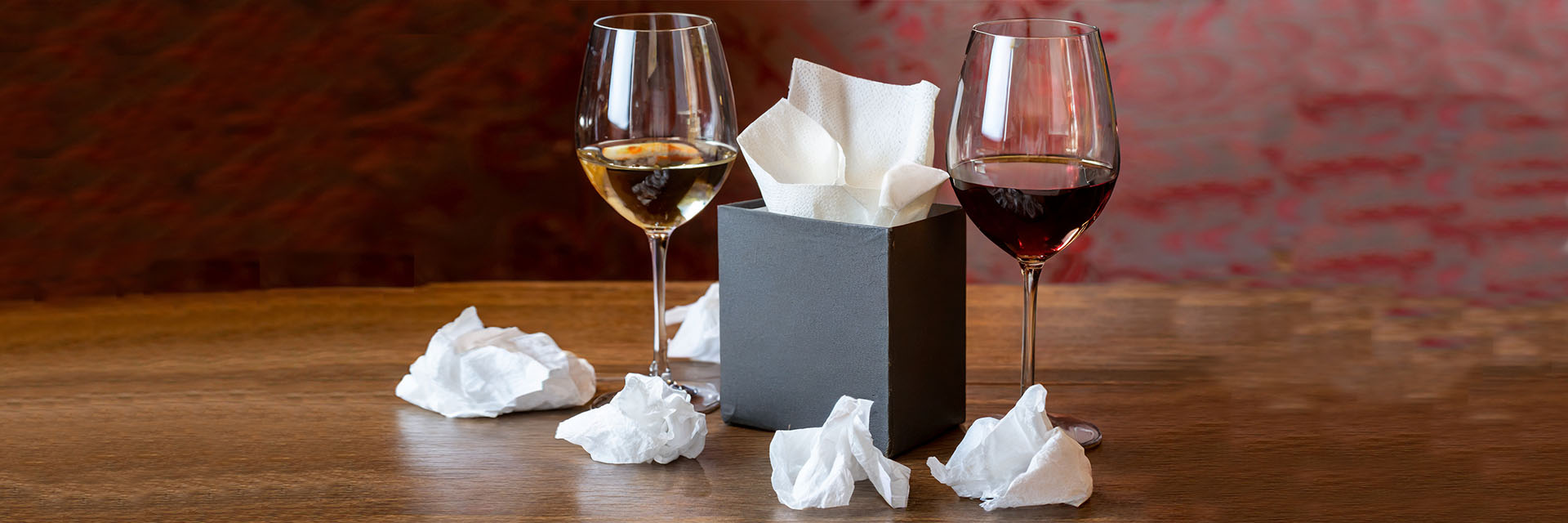Maybe you’ve always noticed some congestion or a case of the sniffles after enjoying a nice glass of wine. Maybe you assumed you had one too many drinks the night before if you woke up with a scratchy throat or a throbbing headache. Or maybe you’ve never thought twice about it and just chalked symptoms up to seasonal allergies. But did you know that alcohol can potentially worsen allergy symptoms?
Alcohol’s Role in Allergy Symptoms
If you’re a seasonal allergy sufferer, you know all about histamine, a chemical compound that can trigger inflammation and allergic reactions. It plays a crucial role in triggering the inflammatory response, which is the body's defense mechanism against foreign substances or tissue damage, and is the cause of those pesky symptoms, such as congestion, itchy, watery eyes, a scratchy throat and headache.
But histamine isn’t something exclusive to just seasonal allergies. Many alcoholic beverages, particularly red wine and beer, contain histamine. Histamine levels in alcoholic drinks can vary, with certain types of alcohol containing higher concentrations than others, such as:
- Red Wine: Red wine is notorious for containing high levels of histamine, particularly histamine-rich varieties like Merlot, Cabernet Sauvignon, and Shiraz. The fermentation process of red wine, including prolonged skin contact during maceration, contributes to the accumulation of histamine.
- Beer: Beer, especially dark beers like stouts and porters, can contain significant levels of histamine. The fermentation of barley and hops in beer production can lead to the formation of histamine, particularly in beers that undergo longer fermentation periods.
- Champagne and Sparkling Wines: Champagne and other sparkling wines may also have elevated histamine levels, although typically not as high as red wine. The carbonation process in sparkling wine production can contribute to histamine formation, albeit to a lesser extent than fermentation.
- Aged and Fermented Alcohols: Alcohols that undergo extensive aging or fermentation processes tend to have higher histamine content. This includes fortified wines like sherry and port, as well as certain types of spirits like whiskey and rum.
- Some Liqueurs: Certain flavored liqueurs may contain added ingredients or flavorings that contribute to higher histamine levels. Additionally, liqueurs that undergo extended aging or fermentation may accumulate histamine over time.
To boot, alcohol also inhibits the production of diamine oxidase (DAO), an enzyme responsible for breaking down histamine in the body. When DAO levels are reduced or inhibited, histamine levels can rise, leading to histamine intolerance or overload. This can result in symptoms resembling allergic reactions, including headaches, nasal congestion, skin flushing, and gastrointestinal discomfort.
Additionally, certain alcoholic beverages, such as wine, may contain sulfites and other additives that can trigger allergic-like symptoms in sensitive individuals. Sulfites are commonly used as preservatives in wine and can induce respiratory symptoms, skin reactions, and headaches. Other additives, such as artificial colors and flavors, may also exacerbate allergic-like responses in some people.
Lastly, alcohol is a diuretic, meaning it increases urine production and can lead to dehydration. Dehydration can exacerbate allergy symptoms, such as dry throat, nasal congestion, and headaches. Additionally, dehydration can compromise the immune system and exacerbate inflammation, making allergic-like reactions more severe.
Many of alcohol's natural properties can worsen allergy symptoms, according to Purvi Parikh, M.D., an allergist with the Allergy & Asthma Network.
"Alcohol can also cause your blood pressure to go up and down by constricting and dilating blood vessels, which can worsen allergic reactions," Parikh says.
Additionally, Parikh says alcohol with a high sugar content can make allergy symptoms worse, since sugar is inflammatory. High sugar content isn't just limited to mixed drinks; wine can also contain more sugar than you may expect. Some mass-produced red wines can contain as much as 12 grams of residual sugar — the sugar that doesn't ferment into alcohol — per liter.
What You Can Do
If you notice an increase in pesky allergy symptoms after drinking, or you’re already suffering from seasonal allergies and worry a drink may make things even worse, Happy Hour can seem like something that is off the table for you. However, there are ways you can have your drink, and drink it too.
Dr. Parikh notes that clear alcohols like vodka, gin or blanco tequila have fewer allergens than other options like wine. Although she does add that your best bet is to not drink alcohol, or have it in very small amounts.
When choosing alcoholic beverages with lower histamine levels, it is recommended to opt for clear or lighter-colored spirits, those with lower alcohol content, and to avoid flavored or colored spirits that may contain higher histamine levels and are usually high in sugar.
If you do choose to drink wine, white and rosé are your best options. While beer can contain histamines, certain types like low-alcohol beer may have lower histamine levels compared to other varieties.
Allergies or not, always make sure you are drinking water as it has the ability to help regulate histamine levels and keep dehydration at bay, which can make symptoms worse.
It’s also important to note that if drinking alcohol triggers severe allergy symptoms such as trouble breathing, swelling, or a rapid pulse, you should stop drinking immediately and seek emergency medical assistance by calling 911. After experiencing an allergic reaction to alcohol, consult a doctor for proper diagnosis and guidance on managing alcohol allergies or intolerances. To prevent future allergic reactions, it is recommended to avoid alcohol entirely if you have confirmed alcohol allergies.
The Takeaway
Individual sensitivity to histamine varies, and not everyone will experience allergic-like reactions to histamine-rich alcoholic beverages. However, for individuals prone to histamine intolerance or sensitivity, opting for low-histamine alcoholic options, such as clear spirits like vodka or gin, may help minimize adverse reactions. Additionally, moderation and paying attention to personal tolerance levels can also be beneficial in managing histamine-related symptoms.

